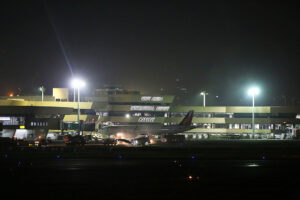SAN MIGUEL-LED New NAIA Infra Corp. (NNIC) is in talks with airline companies to ensure smooth transition and minimal disruption on operations for the closure of Terminal 4 for renovation.
“Our goal is to make Terminal 4 more comfortable and efficient for travelers. While there may be some temporary disruptions, we appreciate the public’s understanding and patience as we work to deliver these much-needed improvements,” NNIC said in a media release over the weekend.
NNIC said the Terminal 4 of Ninoy Aquino International Airport (NAIA) is scheduled for renovation and upgrade beginning Nov. 6 to improve the terminal’s overall infrastructure and passenger flow.
The upgraded new terminal will reopen in February 2025.
NNIC has yet to disclose the investment cost of Terminal 4 renovation, but the group said previously that it is allocating P123.5 billion for overall capital expenditure of the NAIA project.
NNIC formerly SMC SAP & Co. Consortium is composed of San Miguel Corp.; RMM Asian Logistics, Inc.; RLW Aviation Development, Inc.; and Incheon International Airport Corp.
For now, all airlines operating at Terminal 4 will relocate to Terminal 2, the new NAIA operator said, adding that on average Terminal 4 manages about 2,900 passengers per day or about 2.23% of NAIA’s total daily passenger volume.
Budget carrier Cebu Pacific, operated by listed Cebu Air, Inc. said it is relocating the operations of its regional brand Cebgo to Terminal 2 from Terminal 4 effective Nov. 7.
Cebu Pacific said flights to Busuanga (Coron), Caticlan (Boracay), Cebu, Legazpi, Masbate, Naga, San Jose, Siargao, and Surigao will be transferred to Terminal 2.
Boutique airline AirSWIFT Transport, Inc., which was recently acquired by Cebu Pacific is also transferring its operations from Terminal 4 to Terminal 2 starting Nov. 5.
NAIA’s private operator, NNIC took over the operations and maintenance of NAIA on Sept. 14.
According to NNIC, its terminal reassignment plan is to designate Terminal 1 for Philippine Airlines, Terminal 2 for domestic flights, Terminal 3 for all foreign airlines including Cebu Pacific and AirAsia Philippines’ international flights, and Terminal 4 for AirAsia Philippines’ domestic operations. — Ashley Erika O. Jose

















